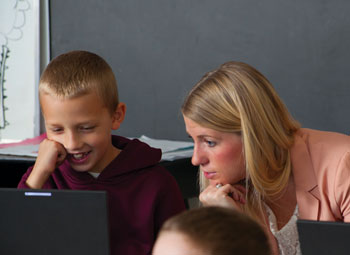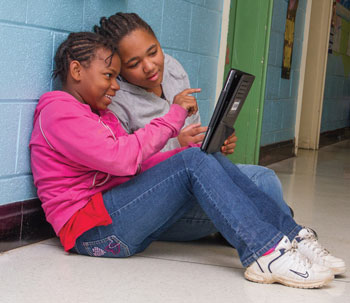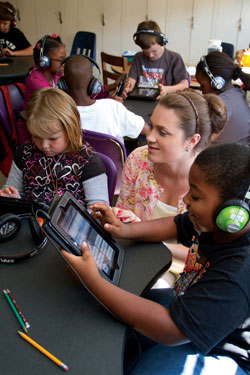Current teaching methods have robbed children of the ability to think for themselves, say educators at Longwood University and Charlotte County Public Schools, who are working together in a one-of-a-kind program to give students back this critical skill.
Longwood and Charlotte County began collaborating this year to implement an innovative teaching method known as project-based learning throughout all grades of a laboratory partnership in the county. Project-based learning focuses student learning on completing complex projects instead of lecture-based teaching.
Charlotte County has been working for years to transition all classrooms in their schools to project-based learning.
Establishing a laboratory partnership with Longwood is part of the implementation of the groundbreaking method.
"We have let the students down by teaching to tests for so many years," said Melody Hackney, Charlotte County Public Schools superintendent. "We have robbed the children of the ability to problem-solve and think for themselves."
The program, which is funded by an $86,000 Virginia College/University Partnership Laboratory School Application Planning Grant, is the only laboratory partnership school of its kind in the region. Longwood’s program is unique because of its focus on project-based learning and the involvement of every school in the Charlotte County division.
On the front lines of this initiative are Longwood students in the final phase of their training to become teachers. These teacher candidates have been trained in project-based learning and are working with children from kindergarten through 12th-grade to shift focus away from test results and more on student engagement and problem solving.
An important aspect of the project-based method is identifying real problems and finding relevant solutions in the classroom. "We look at the community and see the needs that we can address and the things that students relate to," said Lauren Porter ’13, a teacher candidate who works in a second-grade classroom. Whether it’s planning a playground or generating ideas for a bullying campaign, the focus is on relevant solutions for real problems."

Project-based learning is not a new concept, said assistant professor of education Dr. Nancy Powers, who is working closely with students in Charlotte County. In fact, teachers have been incorporating these methods for years. The innovation is the implementation of the methodology across the entire division.
"For Longwood teacher candidates, it’s a twist on what they already know. It’s never been taken to this magnitude," said Powers. "We are still focused on accountability, but we are looking at it from a different perspective: what students need to really understand the material, not just memorize facts."
Longwood has 12 partnership students working in Charlotte County this semester and will add more teacher candidates next semester. Involvement will likely grow as project-based learning is implemented in all classrooms in Charlotte County Public Schools. Greater participation means more data that Longwood can analyze and use to improve teacher preparation classes.
Director of Professional Services Dr. Connie Ballard, who is in charge of teacher implementation at Longwood, said there are long-lasting benefits to Longwood teaching candidates. "This is nontraditional teaching, which should make teaching candidates who participate in a full year more marketable when they graduate, because they will have experience with another instructional technique that results in engaging classrooms that can be integrated across several subject areas," she said.

"This is a win-win situation for everyone involved. The students like the focus of project-based learning and the balance of the accountability standards with that focus. For a principal, the ability to have teachers who know the division and the students before starting work is invaluable," said Powers.
The collaboration sprang out of a 2011 Longwood proposal to initiate a summer lab school. That proposal was married with Charlotte County’s project-based learning initiative to form the state’s only division-wide lab school.
Lab schools are operated in conjunction with a university, and used for teacher training, educational research and experimenting with new methods. Typically these are single schools operated on or near a college campus and built specifically for observation and data collection. The Longwood-Charlotte County lab school partnership’s involvement of every school and student in the division is groundbreaking.
"This gives us the ability to collect a lot of data and apply it using the plan-do-study-act model," said Dr. Wayne White, interim dean of Longwood’s College of Education and Human Services. "We can apply what we learn and tailor both teacher training and classroom instruction to what really works."



Leave a Comment